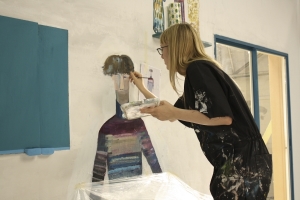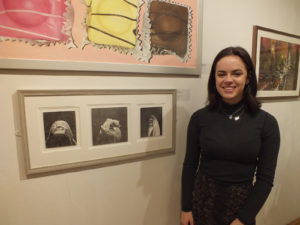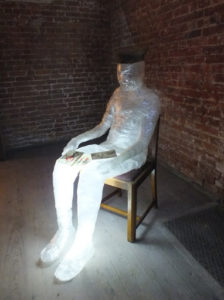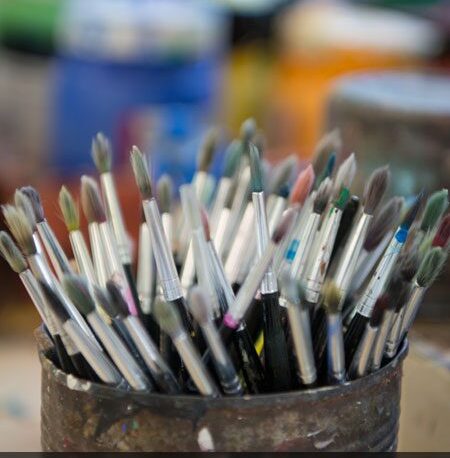Art
We use art to encourage our students to develop and express their ideas through a variety of media.
Key Stage 3
Art at KS3 is a broad based course with a wide variety of activities. We start in Year 7 by developing drawing and painting skills which underpin the teaching in year 8 and 9 of sculpture, more advanced painting and mixed media. The curriculum also enables pupils to develop their presentation and research skills.
Students carry out substantial research and development as part of their work. Each term a new area of focus is taught to develop new practical skills and challenge the students to consider the complexities of visual communication in the modern world. Cultural and artistic influences are taken into account as visual outcomes are developed with the resulting skills and knowledge providing the basis for progression to GCSE.
Key Stage 4
The GCSE Fine Art (AQA specification) allows students to develop their own interests and skills using a multimedia approach that offers opportunities to use traditional and contemporary methods. The disciplines of drawing and painting are popular areas of study for the majority of students however sculpture, mixed media and digital work have also been selected by some students to develop specific ideas.
The Fine Art course is assessed through a combination of coursework and an externally set task
- Coursework (60% of the GCSE) Students in Year 11 submit a folder of coursework that covers the four assessment objectives. This includes a sustained project evidencing the journey from initial engagement to realisation of intentions and a selection of further work undertaken during the course which often takes the form of a mini project.
- Externally Set Task (40%) Students respond to a task set by the examination board (AQA) which assesses their ability to develop an artistic theme leading to the creation of an outcome. Students will choose one starting point from a selection of seven.
The breadth of the course provides students with opportunities to develop very distinct lines of creativity preparing them for more specialist study at college, university or careers in the creative industries.
A level
Fine Art (AQA specification)
The Sixth form course builds on the skills and understanding gained at GCSE but encourages a greater level of ambition as the students become increasingly aware of their individual artistic style and creative influences.
Students are expected to contextualise their work taking inspiration from the work of others and learning how the art world is heavily influenced by cultural, social, and political issues. There is an expectation that some written analysis supports the creation of a substantial amount of practical work. The course allows students to work and select from a wide range of media and disciplines which includes; painting, drawing, sculpture, digital media, photography, animation and mixed media.
Year 1 – Autumn term
In response to a set theme students will develop a set of work that builds on their strengths whilst learning new skills and approaches. In recent years we have used an off site exhibition as a point of focus providing students with the experience of presenting their work in a public setting.
Building on and extending their artistic skills is seen as fundamental to the start of this course.
Component 1: Personal Investigation – Spring and summer terms
Students conduct a practical investigation into an idea, issue, concept or theme supported by written material. The focus of the investigation will be identified independently by the student and lead to a finished visual outcome or a series of finished outcomes in appropriate media. There is an expectation that this unit of work is informed by an aspect of contemporary or past practice of artists, photographers, designers or craftspeople.
Year 2 – Autumn term
Refinement of the Personal Investigation alongside the creation of a highly developed and innovative visual/creative outcome.
Component 2: Externally Set Assignment – Spring term
Students will choose one starting point – from a selection of eight set by the examination board – to develop over a couple of months of preparation time leading to the development of a final outcome during 15 hours of supervised time.
University Successes
Recent students have continued their Art & Design studies at degree level at a range of universities and colleges including; The University of Portsmouth, The University of Southampton – Winchester School of Art, Arts University Bournemouth, The University of Chichester, and West Dean College of Arts and Conservation, Brighton University, Kingston University, Falmouth University, London College of Fashion, University of the Arts London.
Awards and Exhibitions of our past students
 Alumna Daisy Jacobs recently won at the BAFTAs, Edinburgh Film Festival and received an Academy Award nomination for her work on the animated short film, ‘The Bigger Picture’. You can see more of Daisy’s work on The Bigger Picture on her Vimeo channel at: https://vimeo.com/thebiggerpicturefilm (link opens in new window).
Alumna Daisy Jacobs recently won at the BAFTAs, Edinburgh Film Festival and received an Academy Award nomination for her work on the animated short film, ‘The Bigger Picture’. You can see more of Daisy’s work on The Bigger Picture on her Vimeo channel at: https://vimeo.com/thebiggerpicturefilm (link opens in new window).
 Eve Leckey was one of 39 young artists selected by the RBA – The Royal Society of British Artists, to exhibit their work at The Mall Gallery and ROSL – Royal Over Seas League in London 2020. The initial recommendation was put forward by The Arts Society (Solent).
Eve Leckey was one of 39 young artists selected by the RBA – The Royal Society of British Artists, to exhibit their work at The Mall Gallery and ROSL – Royal Over Seas League in London 2020. The initial recommendation was put forward by The Arts Society (Solent).
 One of our exhibits from our 2019 exhibition at Fort Brockhurst, Gosport by Cristelle Gryte. The piece was created in response to the English Heritage site.
One of our exhibits from our 2019 exhibition at Fort Brockhurst, Gosport by Cristelle Gryte. The piece was created in response to the English Heritage site.
For more information on the Art department please visit our Twitter feed: @BayHouseArt
Textiles
Textiles is a subject that blends artistic expression, practical skills, and a deep understanding of textile traditions and contemporary techniques. It empowers students to design and create a wide range of textile outcomes, fostering creativity, problem-solving, and critical thinking.
Key Stage 3: Building a Foundation
Our Key Stage 3 Textiles curriculum offers a diverse exploration of textile design, equipping students with a strong foundation for their future studies.
Years 7 & 8: Exploring Textile Techniques
- Students delve into a variety of textile processes, including polyblock printing, weaving, stencil printing, and hand embroidery.
- In year 7 the colourful theme of ‘Sweets’ provides inspiration for the work, whilst year 8 focuses on the intricate pattern and texture of ‘Reptiles’
- Pupils gain insights into the historical and modern-day processes of textile production.
Year 9: Preparing for GCSEs and Beyond
- Building upon their earlier skills, students create a printed panel embellished with hand-painted elements, appliqué, and embroidery.
- A focus on colour, pattern, and design interpretation helps students develop their artistic abilities.
- Through the exploration of artists’ work highlighting climate change, students learn about the powerful role of art in conveying important messages and promoting environmental awareness.
This curriculum provides students with a solid foundation in textiles, preparing them for future studies and inspiring them to become creative and informed textile practitioners.
GCSE Textile Design
The GCSE Textiles course (AQA specification) encourages students to explore their creativity, develop personal ideas, and experiment with a wide range of textile techniques. Through hands-on experience and contextual understanding, students will learn to:
- Research and develop ideas: Explore personal interests and inspirations to create meaningful textile outcomes.
- Explore textile techniques: Gain proficiency in a variety of techniques, including hand and machine stitching, screen printing, lino printing, batik, and fabric manipulation.
- Understand context: Explore the historical, cultural, and social significance of textiles, and how these factors influence design and production.
Assessment:
The GCSE Textiles course is assessed through a combination of coursework and an externally set task:
- Coursework (60%): Students submit two coursework projects that demonstrate their understanding of textile techniques, design skills, and contextual knowledge.
- Externally Set Task (40%): Students respond to a task set by the examination board, which assesses their ability to apply their knowledge and skills in a new context.
This comprehensive approach to GCSE Textiles provides students with a solid foundation in textile design and prepares them for further studies or careers in the creative industries.
A level Textile Design (AQA specification)
The A Level Textiles course offers a comprehensive exploration of textile design and production. It is ideal for students with a passion for pattern, colour, texture, and creative expression. Through practical experimentation and theoretical study, students will develop the skills and knowledge necessary for a successful career in the textile industry or further study in related fields.
Key Course Features:
Students will be encouraged to investigate their own ideas and experiment with a wide range of textile processes, including machine stitching, printmaking, constructed textiles, fabric manipulation, concept garments, and digital design.
Photography and drawing will form the foundation of each project, as students are expected to work from their own collected images and research the work of historical and contemporary textile practitioners.
Students will have the opportunity to collaborate, discuss, and share their ideas openly, fostering a supportive and inspiring learning environment.
The course encourages students to explore the cultural context of textile design, forming personal connections between their ideas and the broader creative world.
Students will have the chance to exhibit their work throughout the course and visit museums and galleries to gain further inspiration and knowledge.
Year 1
Autumn Term:
- Introduction to textile techniques and processes
- Exploration of various themes and ideas supported by research into traditional and contemporary practice
- Creation of a series of textile outcomes
- Developing confidence in independent creative decision making
Spring & Summer Term:
- Personal investigation focusing on your choice of theme or concept (Component 1)
- Development of an individual project
- Supporting written work of 1000-3000 words
- Creation of highly developmental textile work
- Exploration of disciplines such as textile art, interiors, fashion, or costume design
Year 2
Autumn Term:
- Consolidation of personal investigation
- Creation of ambitious, highly developed outcome
Spring Term:
- AQA Externally Set Assignment (Component 2)
- Select a question from provided options and develop ideas in preparation time
- Development of a final outcome within the 15 hours supervised time

